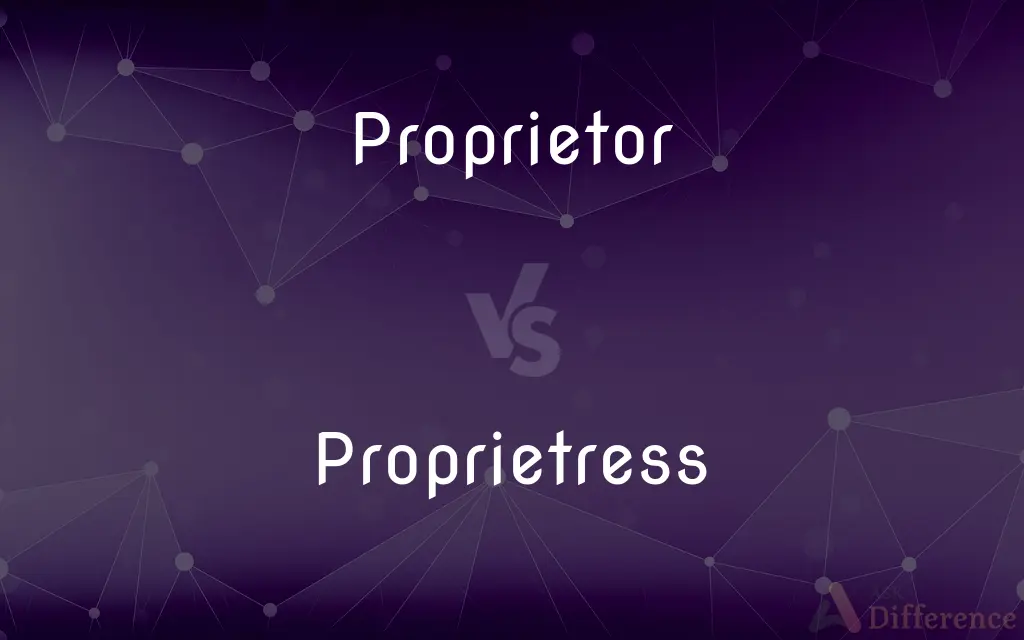Proprietor vs. Proprietress — What's the Difference?
Edited by Tayyaba Rehman — By Urooj Arif — Updated on March 30, 2024
Proprietor refers to the owner of a business or property, while proprietress is the female-specific term for a woman who owns a business or property.

Difference Between Proprietor and Proprietress
Table of Contents
ADVERTISEMENT
Key Differences
The term "proprietor" is used to denote an individual who owns a business or property, implying ownership and the associated responsibilities, rights, and financial stakes. This term is gender-neutral and can be applied to any person regardless of gender who holds ownership. On the other hand, "proprietress" specifically identifies a female proprietor, highlighting the gender of the business or property owner. The use of "proprietress" has become less common in modern usage, reflecting a shift towards gender-neutral language in professional and business contexts.
Both terms encompass the concept of ownership and control over an enterprise or property. Proprietors and proprietresses are typically involved in the management and operational decisions of their businesses or properties, bearing the risks and benefits of their ventures. The main difference lies in the gender distinction implied by "proprietress," a distinction that is increasingly seen as unnecessary as language evolves to become more inclusive.
In practical terms, both a proprietor and a proprietress hold similar positions of authority and responsibility in their business or property. They make key decisions, manage financial affairs, and are integral to the success and failure of their ventures. The distinction between the terms does not imply any difference in capability, role, or function, but rather, reflects linguistic conventions that are changing over time.
The shift away from gender-specific titles like "proprietress" towards the universal "proprietor" (or other gender-neutral terms) mirrors broader societal movements towards equality and neutrality in professional titles. This change emphasizes the role and function of the individual rather than their gender, focusing on their achievements and responsibilities.
Despite the differences in terminology, the essential qualities of leadership, entrepreneurship, and ownership are shared by both proprietors and proprietresses. The choice of term may depend on personal preference, the context in which it is used, and the evolving standards of language.
ADVERTISEMENT
Comparison Chart
Definition
The owner of a business or property
Specifically, a female owner of a business or property
Gender
Gender-neutral
Female-specific
Usage
Common and widely accepted
Less common, with declining usage
Implications
Focus on role and ownership
Highlights the gender of the owner
Context
Business, legal, and property ownership
Traditionally used in contexts where female ownership is emphasized
Compare with Definitions
Proprietor
A person who owns a business or property.
The proprietor of the bookstore regularly hosts community events.
Proprietress
Directly involved in the business operations.
The hotel's proprietress personally oversees guest services.
Proprietor
Bears the financial risks and benefits.
The proprietor invested heavily in new technology for the farm.
Proprietress
A woman who owns a business or property.
The proprietress of the boutique sourced unique products globally.
Proprietor
Holds authority over the property.
The building's proprietor plans to renovate the space.
Proprietress
Employs strategies for business growth.
The salon's proprietress expanded her services to include spa treatments.
Proprietor
Responsible for operational decisions.
As the proprietor, he decided to expand the business online.
Proprietress
Engages in management and decision-making.
As the proprietress, she implemented eco-friendly practices.
Proprietor
May manage the business directly.
The café's proprietor is also its main chef.
Proprietress
Faces the challenges of entrepreneurship.
The proprietress navigated the business through difficult times.
Proprietor
The owner of a business, or a holder of property
Chinese restaurant proprietors
By 1640 he was himself the proprietor of a three-hundred-acre tract
Proprietress
A woman who has legal title to something; an owner.
Proprietor
One who has legal title to something; an owner.
Proprietress
A woman who owns or owns and manages a business or other such establishment. See Usage Note at -ess.
Proprietor
One who owns or owns and manages a business or other such establishment.
Proprietress
A female proprietor.
Proprietor
An owner.
Proprietress
A female proprietor.
Proprietor
A sole owner of an unincorporated business, also called a sole proprietor.
Proprietress
A woman proprietor
Proprietor
One of the owners of an unincorporated business, a partner.
Proprietor
(history) One or more persons to whom a colonial territory is assigned, like a fief, including its administration.
From 10 September 1621 till 12 June 1632, Sir William Alexander, styled Earl of Stirling and Viscount of Canada, was proprietor of the Scottish colony Nova Scotia.
Proprietor
One who has the legal right or exclusive title to anything, whether in possession or not; an owner; as, the proprietor of farm or of a mill.
Proprietor
(law) someone who owns (is legal possessor of) a business;
He is the owner of a chain of restaurants
Common Curiosities
How does one become a proprietor or proprietress?
Becoming a proprietor or proprietress involves acquiring ownership of a business or property, either through starting a business, purchase, or inheritance.
Can a proprietor own multiple businesses or properties?
Yes, a proprietor can own multiple businesses or properties, each with its own set of responsibilities and challenges.
Is "proprietress" still commonly used?
"Proprietress" is less commonly used today, with a trend towards gender-neutral terms like "proprietor."
Why is there a shift towards using "proprietor"?
The shift towards "proprietor" reflects broader movements towards gender neutrality in language, emphasizing roles over gender.
Does the role of a proprietress differ from that of a proprietor?
No, the roles do not differ. Both terms describe the ownership and management responsibilities of a business or property.
Can the use of "proprietor" or "proprietress" affect business perception?
The choice of term may affect perception depending on the audience, with some preferring modern, gender-neutral language.
Are there specific industries where "proprietress" is more commonly used?
Historically, "proprietress" might have been more common in certain industries like hospitality or retail, but its usage is declining in favor of gender-neutral terms.
Can a man be called a proprietress?
No, "proprietress" specifically refers to a woman who owns a business or property. A man would be referred to as a "proprietor."
Is there a legal distinction between a proprietor and a proprietress?
Legally, there is no distinction. Both terms refer to the ownership and managerial control over a business or property.
How important is the role of a proprietor in the economy?
Proprietors play a crucial role in the economy by creating jobs, fostering innovation, and contributing to economic growth.
What are the main responsibilities of a proprietor?
The main responsibilities include managing the business or property's operations, financial management, and strategic planning.
What challenges do proprietors face in today's market?
Challenges include economic fluctuations, competition, technological changes, and maintaining customer engagement.
What skills are beneficial for a proprietor?
Beneficial skills include leadership, financial management, strategic planning, customer service, and adaptability.
Does the size of the business impact the role of the proprietor?
Yes, the size of the business can affect the scope of responsibilities, from hands-on management in small businesses to broader strategic oversight in larger enterprises.
How does societal perception of proprietors vs. proprietresses differ?
Societal perceptions have evolved, with increasing recognition that capability and entrepreneurship are not determined by gender, leading to more neutral language use.
Share Your Discovery

Previous Comparison
Freezing vs. Cold
Next Comparison
Gent vs. GentsAuthor Spotlight
Written by
Urooj ArifUrooj is a skilled content writer at Ask Difference, known for her exceptional ability to simplify complex topics into engaging and informative content. With a passion for research and a flair for clear, concise writing, she consistently delivers articles that resonate with our diverse audience.
Edited by
Tayyaba RehmanTayyaba Rehman is a distinguished writer, currently serving as a primary contributor to askdifference.com. As a researcher in semantics and etymology, Tayyaba's passion for the complexity of languages and their distinctions has found a perfect home on the platform. Tayyaba delves into the intricacies of language, distinguishing between commonly confused words and phrases, thereby providing clarity for readers worldwide.















































